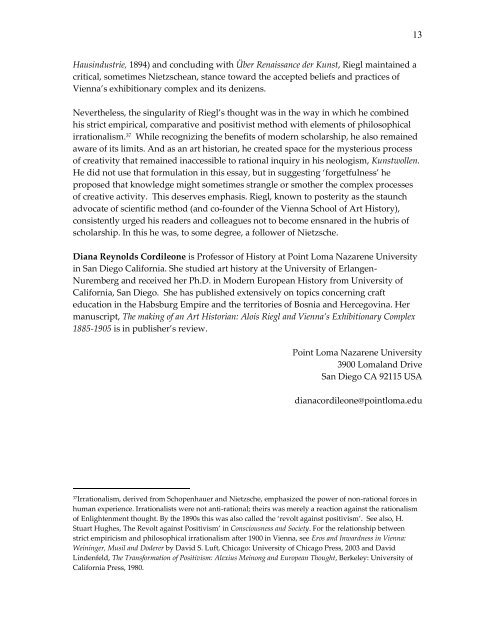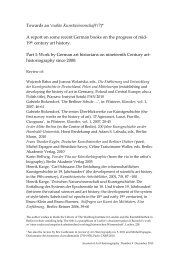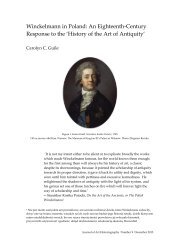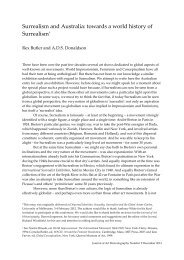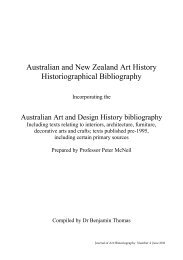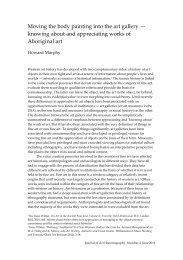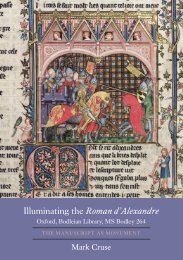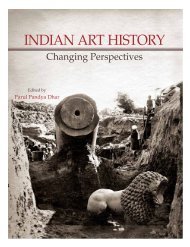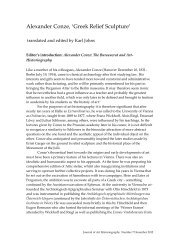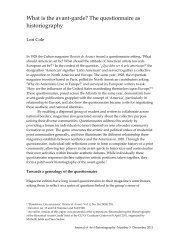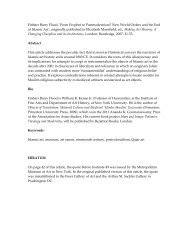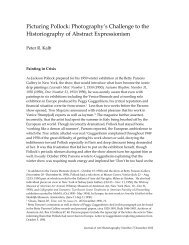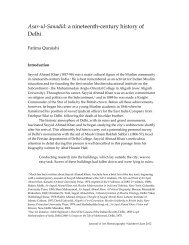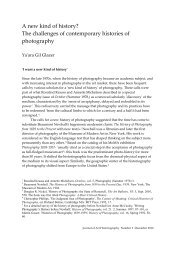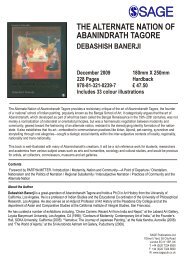The advantages and disadvantages of Art History to Life: Alois Riegl ...
The advantages and disadvantages of Art History to Life: Alois Riegl ...
The advantages and disadvantages of Art History to Life: Alois Riegl ...
Create successful ePaper yourself
Turn your PDF publications into a flip-book with our unique Google optimized e-Paper software.
Hausindustrie, 1894) <strong>and</strong> concluding with Über Renaissance der Kunst, <strong>Riegl</strong> maintained a<br />
critical, sometimes Nietzschean, stance <strong>to</strong>ward the accepted beliefs <strong>and</strong> practices <strong>of</strong><br />
Vienna’s exhibitionary complex <strong>and</strong> its denizens.<br />
Nevertheless, the singularity <strong>of</strong> <strong>Riegl</strong>’s thought was in the way in which he combined<br />
his strict empirical, comparative <strong>and</strong> positivist method with elements <strong>of</strong> philosophical<br />
irrationalism. 37 While recognizing the benefits <strong>of</strong> modern scholarship, he also remained<br />
aware <strong>of</strong> its limits. And as an art his<strong>to</strong>rian, he created space for the mysterious process<br />
<strong>of</strong> creativity that remained inaccessible <strong>to</strong> rational inquiry in his neologism, Kunstwollen.<br />
He did not use that formulation in this essay, but in suggesting ‘forgetfulness’ he<br />
proposed that knowledge might sometimes strangle or smother the complex processes<br />
<strong>of</strong> creative activity. This deserves emphasis. <strong>Riegl</strong>, known <strong>to</strong> posterity as the staunch<br />
advocate <strong>of</strong> scientific method (<strong>and</strong> co-founder <strong>of</strong> the Vienna School <strong>of</strong> <strong>Art</strong> <strong>His<strong>to</strong>ry</strong>),<br />
consistently urged his readers <strong>and</strong> colleagues not <strong>to</strong> become ensnared in the hubris <strong>of</strong><br />
scholarship. In this he was, <strong>to</strong> some degree, a follower <strong>of</strong> Nietzsche.<br />
Diana Reynolds Cordileone is Pr<strong>of</strong>essor <strong>of</strong> <strong>His<strong>to</strong>ry</strong> at Point Loma Nazarene University<br />
in San Diego California. She studied art his<strong>to</strong>ry at the University <strong>of</strong> Erlangen-<br />
Nuremberg <strong>and</strong> received her Ph.D. in Modern European <strong>His<strong>to</strong>ry</strong> from University <strong>of</strong><br />
California, San Diego. She has published extensively on <strong>to</strong>pics concerning craft<br />
education in the Habsburg Empire <strong>and</strong> the terri<strong>to</strong>ries <strong>of</strong> Bosnia <strong>and</strong> Hercegovina. Her<br />
manuscript, <strong>The</strong> making <strong>of</strong> an <strong>Art</strong> His<strong>to</strong>rian: <strong>Alois</strong> <strong>Riegl</strong> <strong>and</strong> Vienna’s Exhibitionary Complex<br />
1885-1905 is in publisher’s review.<br />
13<br />
Point Loma Nazarene University<br />
3900 Lomal<strong>and</strong> Drive<br />
San Diego CA 92115 USA<br />
dianacordileone@pointloma.edu<br />
37 Irrationalism, derived from Schopenhauer <strong>and</strong> Nietzsche, emphasized the power <strong>of</strong> non-rational forces in<br />
human experience. Irrationalists were not anti-rational; theirs was merely a reaction against the rationalism<br />
<strong>of</strong> Enlightenment thought. By the 1890s this was also called the ‘revolt against positivism’. See also, H.<br />
Stuart Hughes, <strong>The</strong> Revolt against Positivism’ in Consciousness <strong>and</strong> Society. For the relationship between<br />
strict empiricism <strong>and</strong> philosophical irrationalism after 1900 in Vienna, see Eros <strong>and</strong> Inwardness in Vienna:<br />
Weininger, Musil <strong>and</strong> Doderer by David S. Luft, Chicago: University <strong>of</strong> Chicago Press, 2003 <strong>and</strong> David<br />
Lindenfeld, <strong>The</strong> Transformation <strong>of</strong> Positivism: Alexius Meinong <strong>and</strong> European Thought, Berkeley: University <strong>of</strong><br />
California Press, 1980.


